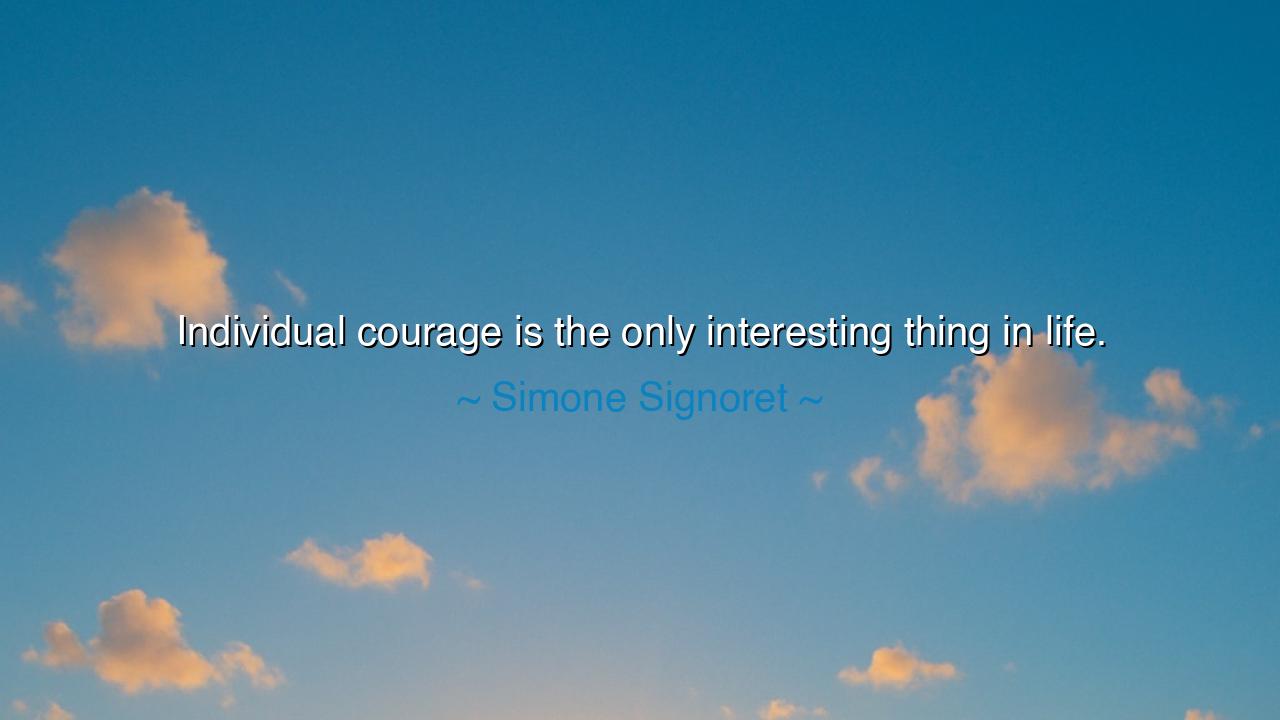
Individual courage is the only interesting thing in life.






“Individual courage is the only interesting thing in life.” — Thus spoke Simone Signoret, the French actress and thinker whose life and art were marked by fierce conviction and quiet defiance. In this single sentence, she distills an eternal truth: that amidst the countless movements of human existence — love and loss, triumph and despair, the rise and fall of nations — it is courage that gives meaning to it all. Without it, beauty fades into vanity, intellect into cowardice, and passion into weakness. To live bravely, to stand firm when the world trembles — this, Signoret tells us, is what makes a life worth remembering.
Born in an age scarred by war and oppression, Signoret saw firsthand how easy it is for people to surrender their integrity when fear and conformity reign. The Europe of her youth was still haunted by the Second World War, when the flames of tyranny tested the souls of millions. From that fire emerged not only destruction, but also countless acts of individual courage — ordinary men and women who risked everything for freedom and truth. Perhaps it was this memory, etched upon the conscience of her generation, that shaped her words. For she knew that history itself turns not on the power of armies, but on the bravery of individuals who refuse to yield when surrender would be easier.
When she calls individual courage the only “interesting” thing in life, she does not mean “interesting” as mere curiosity, but as the mark of what is vital, noble, and alive. Courage, in her view, is the essence of drama — not the drama of the stage, but the inner drama of the soul. The courage to love when love may wound, the courage to speak truth when silence would protect, the courage to act rightly when the crowd does wrong — these are the moments when life transcends the ordinary. Everything else — wealth, fame, pleasure — is transient, but courage transforms the fleeting into the eternal.
Consider the story of Antigone, the ancient heroine who defied the king to bury her brother, believing that the laws of the gods outweighed the laws of men. Her act was not loud or boastful, but born of conviction — a young woman standing alone against a ruler’s wrath. She paid for her defiance with her life, yet her courage became immortal. Across millennia, her name endures, while her tyrant’s name is half-forgotten. It is as if Signoret herself echoes Antigone’s spirit, reminding us that only such personal bravery, carried out in solitude and integrity, leaves a mark upon eternity.
Courage, however, is not confined to battlefields or grand sacrifices. There is everyday courage, too — the courage to forgive, to endure hardship, to start anew after failure, to remain kind in a world that rewards cruelty. In this, Signoret also speaks to the artist’s calling: to portray truth without compromise, to act not for applause but for authenticity. Her own career was marked by such strength. She refused to let Hollywood mold her into an image of glamour; she chose roles that revealed the brokenness and dignity of real human beings. She showed that courage is not only to fight outward enemies, but also to resist the subtle tyranny of comfort, conformity, and fear of judgment.
Yet courage is not arrogance. The ancients taught that true bravery walks hand in hand with humility and conscience. The warrior who fights for glory alone is merely violent; the one who fights for justice is divine. Individual courage, in Signoret’s sense, is not reckless defiance, but the act of choosing integrity over approval, truth over safety, and compassion over indifference. Such courage requires solitude — for it is not the courage of the crowd, but of the soul standing naked before itself.
The lesson, then, is as timeless as it is necessary: live with courage, and life will never be dull. Do not seek to be comfortable, but to be brave in the face of life’s trials. When fear whispers that you are too small, too weak, too late — answer it with action. If you see injustice, speak; if you see suffering, stand near; if you feel truth burning within you, let it guide you, even when the path is lonely. For as Signoret reminds us, it is only in these moments of courage that we truly live — and only through them that the world moves forward.
So remember, my child: every generation is tested, and every heart will face its moment of decision. In that moment, you will find that courage is not found in strength of arm or sharpness of tongue, but in the quiet resolve to do what is right. Let your life be interesting not for its pleasures or possessions, but for its acts of bravery — large or small. For it is courage, and courage alone, that turns an ordinary life into a legend whispered through time.






AAdministratorAdministrator
Welcome, honored guests. Please leave a comment, we will respond soon